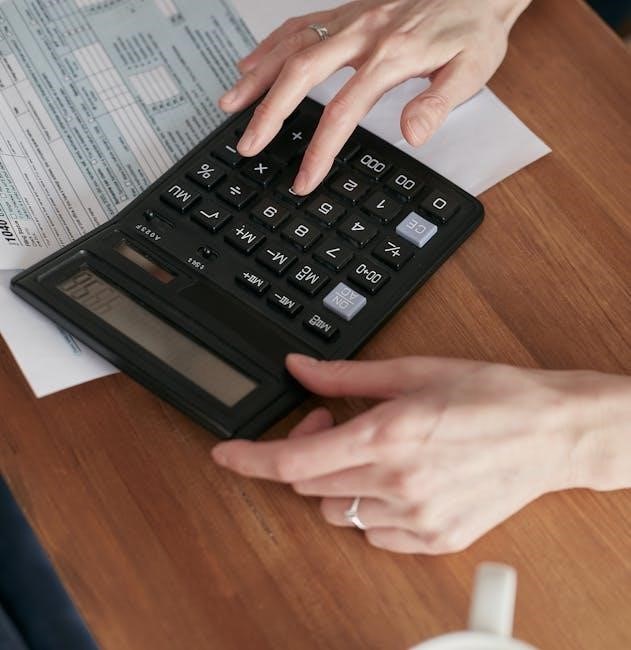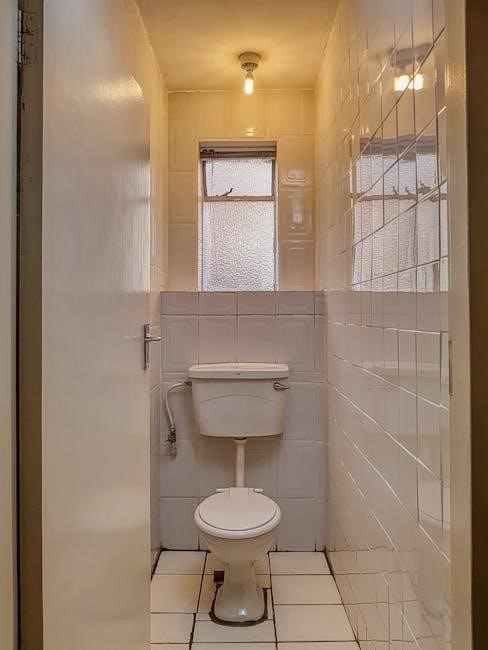Overview of DC Personal Property Tax
The DC Personal Property Tax applies to tangible personal property used in a business or rental activities within Washington, D.C. Annual returns are required, even if no tax is due, and exemptions exist for certain low-value properties or qualified organizations. The tax is administered by the District of Columbia Office of Tax and Revenue, with filings typically submitted online through MyTax.DC.gov.
Definition and Purpose
The DC Personal Property Tax is a levy on tangible personal property used in business or rental activities within Washington, D.C. It applies to assets like furniture, equipment, and vehicles. The tax aims to generate revenue for public services and infrastructure. Exemptions exist for low-value properties and certain nonprofit organizations. The tax is an annual requirement, ensuring compliance with District regulations and supporting local governmental functions. It is administered by the Office of Tax and Revenue, with filings due by July 31 each year.
Types of Personal Property Subject to Tax
Tangible personal property, such as furniture, fixtures, equipment, machinery, vehicles, and inventory, is subject to DC Personal Property Tax. This includes assets used in business operations or rental activities within Washington, D.C. Intangible property, like stocks and bonds, is generally exempt. The tax applies to all tangible items owned or leased by businesses, ensuring compliance with District tax laws. Proper classification of assets is crucial for accurate tax assessments and filings.
Who Must File a DC Personal Property Tax Return
Every individual, corporation, partnership, executor, administrator, guardian, receiver, trustee, or entity owning or holding tangible personal property in Washington, D.C., must file a DC Personal Property Tax Return (Form FP-31). This includes businesses, rental property owners, and freelancers using property for commercial purposes. Even if the property’s value is $225,000 or less, filing is still required. Exemptions may apply for certain entities, but filing remains mandatory to claim them.

Filing Requirements and Deadlines
The DC Personal Property Tax requires filing Form FP-31 annually by July 31. Returns must be submitted online through MyTax.DC.gov, ensuring timely compliance with tax obligations.
FP-31 Form: Personal Property Tax Return
Form FP-31 is the official document for reporting tangible personal property used in business or rental activities in Washington, D.C. It requires detailed information about the property, including its description, acquisition date, and cost. The form also includes sections for exemptions, depreciation, and tax calculations. Instructions are available online, guiding filers through exemptions, due dates, and payment options. Proper completion ensures accurate assessment and compliance with DC tax regulations.
Payment Voucher and Extension Options
The FP-31P Payment Voucher allows taxpayers to submit payments for their DC Personal Property Tax. Payments can be made online through MyTax.DC.gov or by mail. For extensions, Form FP-129A can be filed to request more time to submit the FP-31 return, extending the filing deadline to October 31. However, any tax due must still be paid by the original July 31 deadline to avoid penalties and interest. Proper use of these options ensures compliance with DC tax requirements.
Annual Filing Deadline: July 31
The annual deadline for filing and paying the DC Personal Property Tax is July 31. Returns must be submitted and payments made by this date to avoid penalties and interest. Taxpayers can file and pay online through MyTax.DC.gov, ensuring timely compliance. Even if no tax is due, the FP-31 return must still be filed. Late submissions may result in penalties, emphasizing the importance of adhering to this strict deadline.

Exemptions and Special Cases
Certain personal property exemptions apply, such as low-value property and qualified non-profit organizations. Special provisions exist for new businesses and specific entities.
Exemptions for Low-Value Property
Personal property with a value of $225,000 or less is exempt from taxation in Washington, D.C. However, entities must still file the FP-31 return, even if no tax is owed; This exemption applies to tangible personal property used in business or rental activities, such as equipment, furniture, and vehicles. It does not eliminate the obligation to submit the required documentation and forms. This provision simplifies compliance for small businesses and individuals with limited assets.
Exemptions for Non-Profit Organizations
Non-profit organizations recognized under IRC 501(c)(3) may be exempt from DC Personal Property Tax if they obtain a certificate of exemption from the DC Office of Tax and Revenue. This exemption applies to tangible personal property used for charitable, educational, or religious purposes. However, these organizations must still file Form FP-31 to claim the exemption. The exemption does not apply to property used for unrelated business activities or commercial purposes.

Special Provisions for New Businesses
New businesses in Washington, D.C. must register with the Office of Tax and Revenue via MyTax.DC.gov. They are automatically registered for personal property tax upon filing the initial FP-31 return. A new business exemption may apply for the first year, reducing taxable liability. However, all businesses must submit Form FP-31 annually, even if no tax is owed. Early registration ensures compliance and access to potential tax benefits.

The Filing Process
The DC Personal Property Tax return (Form FP-31) must be filed online through MyTax.DC.gov by July 31 annually. Electronic filing is free and secure.
Online Filing Through MyTax.DC.gov
Online filing for the DC Personal Property Tax is mandatory and must be completed through the MyTax.DC.gov portal. This secure platform allows businesses and individuals to submit Form FP-31 and associated documentation efficiently. Users can create an account, access prior filings, and receive electronic confirmation upon submission. The system is user-friendly, ensuring compliance with deadlines and reducing errors. Electronic filing is free and provides a convenient option for meeting tax obligations.
Step-by-Step Guide to Completing Form FP-31
To complete Form FP-31, start by listing all tangible personal property used in your business or rental activities. Calculate the total assessed value based on DC tax rates. Report any exemptions, such as for low-value property or nonprofit organizations. Attach required documentation, like depreciation schedules or proof of exemption. Ensure all sections are filled accurately, including business details and property descriptions. Sign and date the form before submitting it online via MyTax.DC.gov by the July 31 deadline.
Submission and Confirmation
Once Form FP-31 is completed, submit it electronically through MyTax.DC.gov. Upon submission, you will receive an immediate confirmation. Print or save this confirmation for your records. An email confirmation will also be sent to the address associated with your account. Ensure the submission is made by the July 31 deadline to avoid penalties. Retain the confirmation as proof of filing, as it may be required for future reference or audits.

Payment Options and Penalties
The District of Columbia offers online payment options through MyTax.DC.gov, as well as check payments. Late payments incur penalties and interest, which can increase over time.
Methods of Payment
Payment for the DC Personal Property Tax can be made online through MyTax.DC.gov using a credit card, debit card, or electronic check. Additionally, payments can be made by check or money order, which must include the payment voucher from Form FP-31. Payments are due by July 31 to avoid penalties. Online payments are secure and provide immediate confirmation. For offline payments, checks should be made payable to the District of Columbia Treasurer and mailed with the payment voucher to the address listed on the form;
Consequences of Late Filing or Payment
Failing to file or pay the DC Personal Property Tax by the July 31 deadline results in penalties and interest. A late filing penalty of up to 5% of the unpaid tax may be assessed, along with interest calculated monthly on the outstanding balance. If taxes remain unpaid, the District may pursue collection actions, including liens or levies. Timely filing and payment are crucial to avoid these consequences and ensure compliance with District tax regulations. Penalties and interest can significantly increase the total amount owed.
Interest and Penalty Calculations
The District of Columbia assesses penalties and interest for late filing or payment of personal property taxes. A penalty of up to 5% of the unpaid tax may be applied, along with interest calculated at a monthly rate on the outstanding balance. Interest accrues from the original due date and continues to accumulate until the tax is paid in full. These charges are in addition to the original tax liability and can significantly increase the total amount owed if left unresolved. Timely payment is essential to avoid these additional fees.

Tax Rates and Assessments
The DC tax rates apply to the assessed value of tangible personal property, with rates varying based on the type and use of the property. Annual assessments determine the taxable amount, ensuring accurate tax calculations. The Office of Tax and Revenue oversees the assessment process to maintain fairness and compliance with District regulations. This ensures that all taxable property is valued appropriately for tax purposes.
How Personal Property is Valued
Personal property in DC is valued based on its original cost, adjusted for depreciation over time. The Office of Tax and Revenue assesses the value annually, considering factors like age and condition. Tangible property, such as equipment and furniture, is appraised at its fair market value as of July 1st of each tax year. This valuation determines the taxable amount, ensuring accurate assessment for tax purposes.
Tax Rates for Different Types of Property
Tax rates for DC personal property vary based on the type and value of the property. Tangible personal property, such as business equipment, vehicles, and inventory, is taxed at rates determined by its assessed value. The tax is calculated as a percentage of the property’s value, with specific rates applied to different categories. Exemptions may apply for low-value property or certain organizations, reducing the taxable amount. The exact rates are outlined in the DC tax code and instructions provided with Form FP-31.
Appealing an Assessment
If a taxpayer disagrees with their personal property tax assessment, they may appeal to the District of Columbia Office of Tax and Revenue. The appeal must be filed within the specified deadline, typically outlined in the assessment notice. Taxpayers can request a hearing to present their case and provide supporting documentation to challenge the valuation or classification of their property. The Office of Tax and Revenue will review the appeal and issue a determination, which may be further appealed if unresolved.

Required Forms and Documentation
The primary form for filing DC personal property tax is Form FP-31, the Personal Property Tax Return. Additional forms include FP-31P for payment vouchers and FP-129A for filing extensions. Supporting documentation may include receipts, invoices, and depreciation schedules to verify property values and classifications.
Form FP-31: Instructions and Details
Form FP-31 is the official form for filing DC Personal Property Tax returns. It requires detailed information about the business, including ownership, location, and property details. The form also includes sections for exemptions, depreciation, and tax calculations. Instructions for completing FP-31 are available online and provide guidance on deadlines, payment options, and required documentation. Filers can access the form through MyTax.DC.gov, with electronic submission being the standard method. The deadline for filing is July 31 annually.
Supporting Documents for Filing
When filing Form FP-31, certain supporting documents may be required to complete the return accurately. These include records of tangible personal property, such as equipment, furniture, and vehicles. A detailed depreciation schedule and proof of any exemptions, like those for non-profit organizations, must also be provided. Additionally, invoices or appraisals for high-value items may be needed to verify their worth. Ensure all documents are up-to-date and reflect the current tax year to avoid delays in processing.
Recordkeeping Requirements
Taxpayers must maintain accurate records of tangible personal property for at least three years from the due date of the return. This includes depreciation schedules, invoices, and proof of ownership. Digital copies are acceptable if they replicate the original documents. Records should clearly detail the acquisition, value, and disposition of property. Proper documentation is essential for audits and ensuring compliance with DC tax laws. Failure to maintain adequate records may result in delays or penalties during assessments.

Additional Resources and Assistance
For assistance, visit MyTax.DC.gov for guides, FAQs, and contact information. The Office of Tax and Revenue provides support for personal property tax inquiries and filings.
Helpful Links and Guides
Visit MyTax.DC.gov for detailed instructions, forms, and FAQs on DC Personal Property Tax. The website offers step-by-step guides for filing Form FP-31, payment options, and exemption criteria. Additional resources include user guides for online filing and a comprehensive FAQ section to address common questions. For further assistance, consult the Office of Tax and Revenue website or contact their support team directly.
Contact Information for Support
For assistance with DC Personal Property Tax, contact the Office of Tax and Revenue (OTR) at https://otr.cfo.dc.gov/. Call (202) 727-4829 for phone support, or email your inquiries. Mailing address: 1101 4th Street, SW, Suite 270 West, Washington, DC 20024. OTR also provides online resources, including user guides and FAQs, to help with filing and understanding tax requirements. Representatives are available to assist Monday–Friday, 8:30 AM–4:30 PM.
Frequently Asked Questions
What is the DC Personal Property Tax? It is an annual tax on tangible personal property used in a business or rental activities. Who must file? Any individual or entity owning such property in DC. What is the deadline? July 31 each year; Can I file online? Yes, through MyTax.DC.gov. Are exemptions available? Yes, for low-value property or certain organizations. What if I miss the deadline? Penalties and interest may apply. Visit https://otr.cfo.dc.gov/ for more details.
